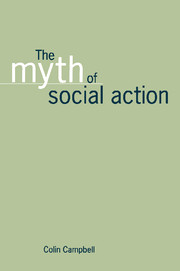Book contents
- Frontmatter
- Contents
- 1 Introduction
- 2 Action reported missing in action theory
- 3 Action and social action
- 4 Action versus social action
- 5 The rise of social situationalism
- 6 The argument by denial
- 7 Accounts and actions
- 8 The argument by exclusion
- 9 The argument through incorporation
- 10 The ‘learning everything from others’ thesis
- 11 The communicative act paradigm
- 12 The linguistic turn for the worse
- 13 The myth of social action
- 14 The obstacle which is social situationalism
- 15 Epilogue: bringing action back in
- Notes
- Bibliography
- Index
15 - Epilogue: bringing action back in
Published online by Cambridge University Press: 07 May 2010
- Frontmatter
- Contents
- 1 Introduction
- 2 Action reported missing in action theory
- 3 Action and social action
- 4 Action versus social action
- 5 The rise of social situationalism
- 6 The argument by denial
- 7 Accounts and actions
- 8 The argument by exclusion
- 9 The argument through incorporation
- 10 The ‘learning everything from others’ thesis
- 11 The communicative act paradigm
- 12 The linguistic turn for the worse
- 13 The myth of social action
- 14 The obstacle which is social situationalism
- 15 Epilogue: bringing action back in
- Notes
- Bibliography
- Index
Summary
This book has taken the form of an extended critique of what is currently orthodox opinion within micro-sociology, if not the discipline more generally. As such it has been necessarily negative in tone and content. However, this critique has not been undertaken for its own sake, but in order to ‘clear away the undergrowth’ which has been allowed to grow up and choke the still-delicate sapling which is the interpretive action theory tradition. That task undertaken (with what degree of success, if any, is a matter for others to judge), it is appropriate to end the book on a more positive note by indicating something of the direction which any ‘green shoots’ of new growth might take. In order to do this it is necessary to reflect on what a truly successful and viable theory of action might look like and consequently how best to avoid some of the mistakes which have characterised theorising about action to date.
It should be obvious to the reader that the attack on social situationalism has not been a prelude to the advocacy of a rationalistic or even empiricist paradigm for studying action such as is represented by rational actor or rational choice theories. These perspectives have increased greatly in popularity among sociologists in recent years and are not so easily dismissed by their critics as once they were. But then, as suggested earlier, this development must be seen as closely related to the success of social situationalism itself. The rise of the latter has clearly served to prompt new interest in the former and thus effectively worked to polarise the profession.
- Type
- Chapter
- Information
- The Myth of Social Action , pp. 155 - 162Publisher: Cambridge University PressPrint publication year: 1996



